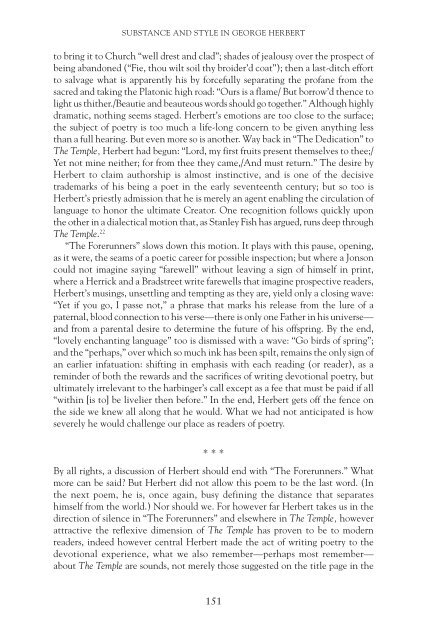ENG LYRIC POETRY.pdf - STIBA Malang
ENG LYRIC POETRY.pdf - STIBA Malang
ENG LYRIC POETRY.pdf - STIBA Malang
You also want an ePaper? Increase the reach of your titles
YUMPU automatically turns print PDFs into web optimized ePapers that Google loves.
SUBSTANCE AND STYLE IN GEORGE HERBERT<br />
to bring it to Church “well drest and clad”; shades of jealousy over the prospect of<br />
being abandoned (“Fie, thou wilt soil thy broider’d coat”); then a last-ditch effort<br />
to salvage what is apparently his by forcefully separating the profane from the<br />
sacred and taking the Platonic high road: “Ours is a flame/ But borrow’d thence to<br />
light us thither./Beautie and beauteous words should go together.” Although highly<br />
dramatic, nothing seems staged. Herbert’s emotions are too close to the surface;<br />
the subject of poetry is too much a life-long concern to be given anything less<br />
than a full hearing. But even more so is another. Way back in “The Dedication” to<br />
The Temple, Herbert had begun: “Lord, my first fruits present themselves to thee;/<br />
Yet not mine neither; for from thee they came,/And must return.” The desire by<br />
Herbert to claim authorship is almost instinctive, and is one of the decisive<br />
trademarks of his being a poet in the early seventeenth century; but so too is<br />
Herbert’s priestly admission that he is merely an agent enabling the circulation of<br />
language to honor the ultimate Creator. One recognition follows quickly upon<br />
the other in a dialectical motion that, as Stanley Fish has argued, runs deep through<br />
The Temple. 22<br />
“The Forerunners” slows down this motion. It plays with this pause, opening,<br />
as it were, the seams of a poetic career for possible inspection; but where a Jonson<br />
could not imagine saying “farewell” without leaving a sign of himself in print,<br />
where a Herrick and a Bradstreet write farewells that imagine prospective readers,<br />
Herbert’s musings, unsettling and tempting as they are, yield only a closing wave:<br />
“Yet if you go, I passe not,” a phrase that marks his release from the lure of a<br />
paternal, blood connection to his verse—there is only one Father in his universe—<br />
and from a parental desire to determine the future of his offspring. By the end,<br />
“lovely enchanting language” too is dismissed with a wave: “Go birds of spring”;<br />
and the “perhaps,” over which so much ink has been spilt, remains the only sign of<br />
an earlier infatuation: shifting in emphasis with each reading (or reader), as a<br />
reminder of both the rewards and the sacrifices of writing devotional poetry, but<br />
ultimately irrelevant to the harbinger’s call except as a fee that must be paid if all<br />
“within [is to] be livelier then before.” In the end, Herbert gets off the fence on<br />
the side we knew all along that he would. What we had not anticipated is how<br />
severely he would challenge our place as readers of poetry.<br />
* * *<br />
By all rights, a discussion of Herbert should end with “The Forerunners.” What<br />
more can be said? But Herbert did not allow this poem to be the last word. (In<br />
the next poem, he is, once again, busy defining the distance that separates<br />
himself from the world.) Nor should we. For however far Herbert takes us in the<br />
direction of silence in “The Forerunners” and elsewhere in The Temple, however<br />
attractive the reflexive dimension of The Temple has proven to be to modern<br />
readers, indeed however central Herbert made the act of writing poetry to the<br />
devotional experience, what we also remember—perhaps most remember—<br />
about The Temple are sounds, not merely those suggested on the title page in the<br />
151










